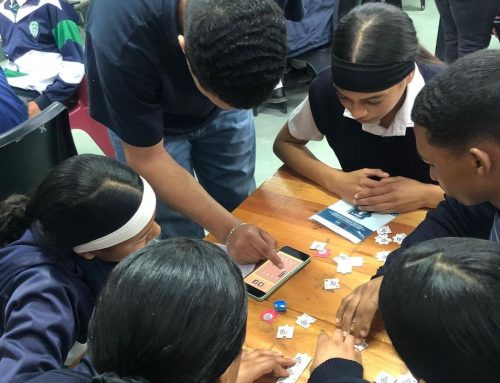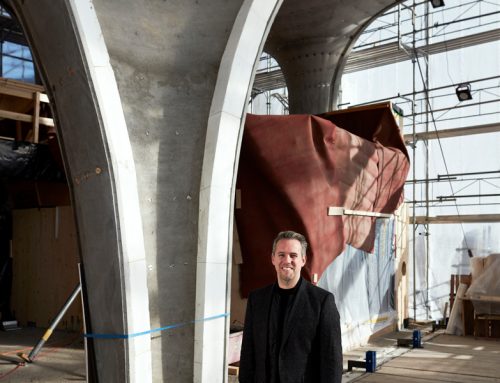 Nic Kohler, Wits alumnus (BSc 1993) and the CEO of the Hollard Insurance Group, talks to Heather Dugmore about alpine challenges and the need for business and capitalism to change.
Nic Kohler, Wits alumnus (BSc 1993) and the CEO of the Hollard Insurance Group, talks to Heather Dugmore about alpine challenges and the need for business and capitalism to change.
We all know that accident and health insurance is really only tested in complex, bizarre situations, and who better to attest to this than Nic Kohler.
Over tea in his office at Hollard Insurance’s head office in Parktown, Joburg, – a stately complex with Herbert Baker buildings and giant old Jacaranda trees lining the driveway – he shares the following story:
“Halfway through Day 6, on a steep, treacherous descent, I went too fast and landed up flying off the edge of a cliff. Fortunately I only fell a short distance but the handlebars sliced open my stomach and thigh muscles.”
Kohler is describing what happened in 2012 during the Italian leg of the Transalp Mountain Bike Stage Race across the Alps. This is one of the toughest mountain bike races in the world.
He had to be airlifted to an Italian hospital by helicopter. The handlebars missed his femoral artery by less than a centimetre. If it had been severed he would not be here to tell the tale. If he hadn’t been comprehensively covered for this extreme kind of emergency … well, he was.
“The main trauma was not being able to finish the race,” he smiles. “And when I got back to work of course I had to put up with endless ribbing from my colleagues about whether I was competent to be running an insurance business, for which sound risk management is critical.”
These days he’s slightly more wary of vertical descents but nothing will keep him off his mountain bike or away from that monster of mountain bike races, the Cape Epic. It’s also much closer to his home in Joburg and excellent medical care.
“Accidents are an important part of learning and building skills. Admittedly small accidents are better than big ones but I believe in perseverance, and in getting right back on that horse or bicycle and climbing the next mountain,” he says.
Perseverance and hard work runs in the blood of this third generation Witsie who was a resident of Ernest Oppenheimer Hall in the late 1980s/early 1990s when he studied statistics and actuarial science.
“In 1989 there was plenty of police action on campus. They would frequently use teargas to disperse crowds of students calling for Mandela’s release, which, as we know happened in February 1990,” explains Kohler who chaired the first non-racial house committee at EOH in 1991.
Everyone on campus felt the gravitas of the era, but there was also plenty of youthful folly, and Kohler admits that he “may have run through the streets of Hillbrow with very little clothing on and frightened the life out of the fish in the Wartenweiler Library fountain.”
As he speaks, the different tones of his personality joust for position. The side of him that believes you shouldn’t take yourself too seriously sprinkles the conversation with playful anecdotes, but his deeply respectful, responsible core being moves to centre stage every time.
There is no doubt the fish in the fountain can also attest that he put in serious hours of study in order to graduate. And he has continued working extremely hard for 24 years to get where he is in his profession, 19 years of which have been with Hollard.
“The knowledge, wisdom and belief that we all have the power to change things that seem unmovable, all of which I gained during my time at Wits, has enabled me to contribute, through Hollard, to a more sustainable society, and a work environment where people can thrive,” says Kohler, who strongly believes that capitalism and business needs to change.
“There is no doubt in my mind that the extraction mindset of business as we know it, and the capitalist system within which we currently operate, is unsustainable. This form of capitalism, which seeks to maximise shareholder wealth above all else, created the global financial crisis of 2008 and the subsequent increase in unemployment, social unrest and austerity measures.
“If we don’t start to embrace the concept of a more conscious form of capitalism, if we don’t accept the responsibility of helping to address inequality and becoming more constructive contributory members of society, then I fear we will all become the helpless observers of an unraveling.”
He explains that in South Africa, where the unemployment rate is between 25% and 37% and where 53% of youth are unemployed, companies need to rethink their role in society, both in terms of the business they do and the way in which they do business.
“While there is no doubt that the profit motive is a critical part of business, it cannot be the sole measure of a company’s success. Performance indicators must also measure how a company is contributing to building social capital, human capital and environmental capital.”
Kohler adds that the wage gap between CEOs or business owners and the majority of staff members is far too large and that companies need to address this.
“At Hollard we are making sure that the greatest percentage increases are being paid to the lowest paid staff to ensure that they can lead dignified lives,” he explains.
To achieve this, the company is researching basic living costs and educational costs and they have raised the minimum wage to reflect this.
“I also believe that we have shown restraint in executive pay and I think it is an issue we should be prepared to address further. I would support capping of executive pay. There comes a point when you are earning enough and more than this is greedy. We live in a country with an enormous inequality problem and we need to be sensitive to this and to play our part in addressing this.
“I am confident that if all South African institutions think more holistically about our impact on- and contribution to broader society, then we will collectively make an important difference.”
Hollard is a founding member of an initiative called the Harambee Youth Employment Accelerator (harambee.co.za), which seeks to address market employment failure by matching and placing disadvantaged but talented young people in full-time employment through an outstanding bridging programme.
Harambee helps young people with a matric or equivalent qualification who have been looking for a full-time job, but have not been able to find one. It does the same for young people with a university degree or other tertiary qualification.
“I am proud to say that from 2011 to 2015 the initiative has placed over 20,000 young people in formal jobs,” says Kohler. “Over the next 5 years, we hope to bring 500,000 young people closer to work, providing all of them with market-relevant employability services and assisting 100,000 young people to find formal jobs.”
As the father of four, he and his wife Janet are committed to South Africa and to helping improve the lives of fellow South Africans.
“I hope to raise wonderful, hardworking, socially conscious children. Three of our children are under ten years of age and our fourth, a foster child, is 21 and working in a call-centre.”
They fostered their oldest daughter, Ivy Tshabalala, when she was 13 years old. She is the child of Kohler’s late housekeeper, Catherine Tshabalala. Shortly after graduating from Wits he made a commitment to Catherine that if anything happened to her, he would help Ivy to get a decent education. Sadly, Catherine passed away.
“I managed to find Ivy near Harare in Zimbabwe. I went there with the intention of making sure that she was in a good school but she was living in such terrible conditions that I received permission from her relatives to foster her. My wife was incredibly supportive of Ivy becoming a member of our family.”
Education at all levels is a key focus for Kohler who regards it as South Africa’s most pressing problem that needs to be creatively solved.
“There is this fascinating book called ‘Abundance: The Future Is Better Than You Think’ by engineer and physician, Peter Diamandis, who is part of an organisation called Singularity University.
“It’s all about leveraging exponentially developing technology to start overcoming humanity’s biggest challenges, including education, poverty and inequality,” Kohler explains. “If used appropriately, technology can increasingly enable citizens in developing countries to take charge of improving their own lives and prospects, rather than being constrained by inefficient governments.
“Technology can be used to clean water in deep rural communities, it can be used to facilitate education and generate energy efficiently, cheaply and renewably.
“When 800 million resourceful African people, unconstrained by conventional wisdom, are able to access better education and the world wide web, there will be an explosion of global innovation and progress. The world will move forward rapidly, without waiting for governments that may or may not follow through on their promises.”
He believes that South Africa and the world need idealists, imaginers and revolutionary thinkers: “We need the curious, the explorers and the lifetime learners. We need people with a head for paradox and hands for hard work. But most of all, we need people with heart.”




